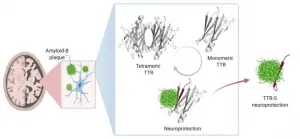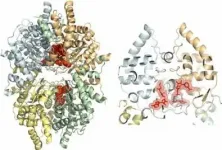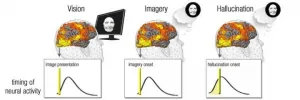Sleep is irreplaceable for the recovery of the brain
Active recovery processes take place in the brain during sleep that cannot be replaced by rest
2021-01-07
(Press-News.org) Sleep is ubiquitous in animals and humans and vital for healthy functioning. Thus, sleep after training improves performance on various tasks in comparison to equal periods of active wakefulness. However, it has been unclear so far whether this is due to an active refinement of neural connections or merely due to the absence of novel input during sleep. Now researchers at the Medical Center - University of Freiburg have succeeded in showing that sleep is more than rest for improving performance. The findings, which were published in the journal SLEEP on January 6, 2021, provide important information for planning periods of intensive learning or training.
"Sleep is irreplaceable for the recovery of the brain. It cannot be replaced by periods of rest for improved performance. The state of the brain during sleep is unique," says Prof. Dr. Christoph Nissen, who headed the study as research group leader at the Department of Psychiatry and Psychotherapy at the Medical Center - University of Freiburg and is now working at the University of Bern, Switzerland. In earlier studies, Nissen and his team provided evidence for the notion that sleep has a dual function for the brain: Unused connections are weakened and relevant connections are strengthened.
In the current study, the researchers conducted a visual learning experiment with 66 participants. First, all participants were trained distinguishing certain patterns. Afterwards, one group was awake watching videos or playing table tennis. The second group slept for one hour and the third group stayed awake, but was in a darkened room without external stimuli and under controlled sleep laboratory conditions. Not only did the group that slept perform significantly better than the group that was awake and active, but the sleep group also performed significantly better than the group that was awake, but deprived from any external stimuli. The improvement in performance was linked to typical deep-sleep activity of the brain, which has an important function for the connectivity of nerve cells. "This shows that it is sleep itself that makes the difference," says co-study leader Prof. Dr. Dieter Riemann, head of the sleep laboratory at the Department of Psychiatry and Psychotherapy at the Medical Center - University of Freiburg. In control experiments, the Freiburg researchers ensured that fatigue and other general factors had no influence on the results.
The study shows that sleep cannot be replaced by rest during phases of intensive performance demands at work or in everyday life.
INFORMATION:
ELSE PRESS RELEASES FROM THIS DATE:
2021-01-07
January 7, 2021 (BRAMPTON - HAMILTON) -- When dealing with a life-limiting illness, palliative care can improve the quality of life for patients and families. However, for many people, the fear of "end of life" care prevents them from exploring it. A recent study from William Osler Health System (Osler) and McMaster University examined awareness of palliative care in the South Asian community and found that culture plays a critical role in the perception of palliative care. This perception, in turn, affects whether or not patients will be open to receiving it.
Funded by a McMaster University, Department ...
2021-01-07
TORONTO, January 7, 2021- What feels like up may actually be some other direction depending on how our brains process our orientation, according to psychology researchers at York University's Faculty of Health.
In a new study published in PLoS One, researchers at York University's Centre for Vision Research found that an individual's interpretation of the direction of gravity can be altered by how their brain responds to visual information. Laurence Harris, a professor in the Department of Psychology in the Faculty of Health and Meaghan McManus, a graduate student in his lab, found, using virtual reality, that people differ ...
2021-01-07
DALLAS - Jan. 7, 2020 - A protein that wreaks havoc in the nerves and heart when it clumps together can prevent the formation of toxic protein clumps associated with Alzheimer's disease, a new study led by a UT Southwestern researcher shows. The findings, published recently in the Journal of Biological Chemistry, could lead to new treatments for this brain-ravaging condition, which currently has no truly effective therapies and no cure.
Researchers have long known that sticky plaques of a protein known as amyloid beta are a hallmark of Alzheimer's and are toxic to brain cells. As early as the mid-1990s, other proteins were discovered in these plaques as well.
One of these, a protein known as transthyretin (TTR), ...
2021-01-07
Brazilian researchers have managed to decipher the structure of a protein found in parasites that cause neglected tropical diseases, paving the way to the development of novel medications. Thanks to the discovery it will be possible to seek more potent molecules capable of destroying the pathogens directly, with fewer adverse side-effects for patients.
The study detailed the structural characteristics of the protein deoxyhypusine synthase (DHS), found in Brugia malayi, one of the mosquito-borne parasites that cause elephantiasis, and in Leishmania major, the protozoan that causes cutaneous leishmaniasis.
Elephantiasis, also known as lymphatic filariasis, is an infection of the lymph system that can lead to swelling of the legs, arms, and genitalia. It may also harden and ...
2021-01-07
HOUSTON - (Jan. 7, 2021) - Proteogenomic analysis may offer new insight into matching cancer patients with an effective therapy for their particular cancer. A new study identifies three molecular subtypes in head and neck squamous cell carcinoma (HNSCC) that could be used to better determine appropriate treatment. The research led by Baylor College of Medicine, Johns Hopkins University and the National Cancer Institute's Clinical Proteomic Tumor Analysis Consortium (CPTAC) is published in the journal Cancer Cell.
Researchers profiled proteins, phosphosites and signaling ...
2021-01-07
TROY, N.Y. -- In a money-saving revelation for organizations inclined to invest in specialized information technology to support the process of idea generation, new research suggests that even non-specialized, everyday organizational IT can encourage employees' creativity.
Recently published in the journal Information and Organization, these findings from Dorit Nevo, an associate professor in the Lally School of Management at Rensselaer Polytechnic Institute, show standard IT can be used for innovation. Furthermore, this is much more likely to happen when the technology is in the hands of employees who are motivated to master technology, understand their role in the organization, ...
2021-01-07
In a study to examine a Mediterranean diet in relation to prostate cancer progression in men on active surveillance, researchers from The University of Texas MD Anderson Cancer Center found that men with localized prostate cancer who reported a baseline dietary pattern that more closely follows the key principles of a Mediterranean-style diet fared better over the course of their disease.
"Men with prostate cancer are motivated to find a way to impact the advancement of their disease and improve their quality of life," said Justin Gregg, M.D., assistant professor of Urology and lead author of the study, published today in Cancer. ...
2021-01-07
Tsukuba, Japan - Does losing weight while you sleep sound too good to be true? According to a study by the University of Tsukuba, it seems that drinking oolong tea might help you do just that.
While all tea comes from the same plant, Camellia sinensis, the degree of oxidation, a chemical reaction that turns tea leaves black, defines its specific type. For example, green tea is unoxidized and mild in flavor, while the distinctive color of black tea comes from complete oxidation. Oolong tea, being only partially oxidized, lies somewhere in between and displays characteristics ...
2021-01-07
Some people have lost their eyesight, but they continue to "see." This phenomenon, a kind of vivid visual hallucination, is named after the Swiss doctor, Charles Bonnet, who described in 1769 how his completely blind grandfather experienced vivid, detailed visions of people, animals and objects. Charles Bonnet syndrome, which appears in those who have lost their eyesight, was investigated in a study led by scientists at the Weizmann Institute of Science. The findings, published today in Brain, suggest a mechanism by which normal, spontaneous activity in the visual centers of the brain can trigger visual hallucinations in the blind.
Prof. Rafi Malach and his group members of the Institute's Neurobiology Department research the phenomenon of spontaneous "resting-state" ...
2021-01-07
Research from life-saving charity Air Ambulance Kent Surrey Sussex (KSS) in partnership with the University of Surrey has shown the benefits of dispatching HEMS to patients with a sudden, unexplained LOC of medical origin and a high prevalence of acute neurological pathology.
The study - which is believed to be the first published about HEMS dispatch to non-trauma (neuro) cases - also highlights how HEMS dispatchers in dialogue with ambulance personnel are able to select patients requiring HEMS-specific interventions and, based on its findings, identifies opportunities to improve triage for these patients.
Through a retrospective study of all patients with a LOC ...
LAST 30 PRESS RELEASES:
[Press-News.org] Sleep is irreplaceable for the recovery of the brain
Active recovery processes take place in the brain during sleep that cannot be replaced by rest


